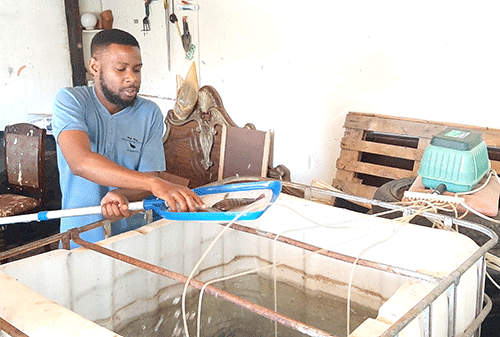SWAKOPMUND – Swakopmund resident and law graduate Octavio Maketo has successfully transformed a leisure activity that began during the 2020 Covid-19 lockdown into a flourishing aquatic fish farming business.
The self-taught fish farmer was once the laughing stock of friends and family, but his drive and passion have turned his new hobby into not only a pastime, but also a revenue stream.
Maketo (32), now runs an aquaponic set-up from the family garage without any financial assistance, using everyday items. He farms with the popular freshwater fish Tilapia, which he sells to restaurants and community members to generate money which he reinvests in his business as well as to sustain himself.
Tilapias are freshwater fish inhabiting shallow streams, ponds, rivers and lakes, and are less commonly found living in brackish water. Historically, they have been of major importance in artisanal fishing in Africa,
and they are of importance in aquaculture and aquaponics.
There is nothing fancy about his system, but it operates like any other expensive aquaponic system using materials readily collected, with limited maintenance, and promotes water recycling.
Taking New Era through his plant, Make
to said during the Covid-19 lockdown, he could not just sit at home, and initially started a small gardening project.
“I had to find a way to use my time, instead of job hunting. The idea was to try and create employment for myself, but at the same time also share my knowledge with others in similar situations,” he noted.
Maketo said he wanted to see how he
could play his part in reducing Namibia’s reliance on food imports, as economic self-sufficiency is of paramount importance.
According to him, he wanted to explore how he could incorporate aquaculture, leading him to invest time in learning and experimenting with small-scale fish farming.
His unique approach, which blends fish farming with aquaponics (the integration of aquaculture and hydroponics), now sets his venture apart from traditional fisheries.
“I had to do a lot of reading and research. After that, I bought a water tank very cheaply, and prepared it after I learned that one can buy fingerlings for a mere 25 cents from the fisheries ministry. Through consultations, I bought 200 fingerlings, and never looked back after that,” an enthusiastic Maketo added.
Prior to the delivery of the fingerlings, he acquired a water tank which he cut in half to serve as fishponds. The most expensive part he needed was a water purification system, which cost about N$4 000.
“I did not have money, so I used materials I could find around the house and made my own, which has been working ever since. I also bought fish feed from the ministry, but that is a bit expensive, and I had to think of a way to cut costs,” said Maketo.
Through research, he learned that he could combine hydroponics and aquaculture, and that is how he found out that fish can feed on the spinach he has been growing as well.
“Nine months after buying my fingerlings, I could harvest tilapia from my ponds. That was a proud moment, but I also realised that the impression out there is that this is expensive, but it is not. You can start with the N$50 you have in your pocket. I have not invested massive amounts of money. At this stage, I am still investing what I am making from the fish sales in my project, but I make enough that I can live off,” Maketo said.
He now believes that projects like his, which combine tilapia farming and vegetable cultivation, can add value to the country’s food production and economic independence. His mission is to inspire others, and share the knowledge he gained to encourage fellow Namibians to initiate their own projects and become self-reliant.
“The project’s growth was incremental, with the first fish being harvested after nine months of dedicated efforts. The project’s primary goal was not to generate profits immediately. Instead, I reinvested the initial earnings, focusing on becoming self-sufficient and improving my project,” he continued.
Maketo said another spinoff from his project is that he can sell the water from fish farming as fertiliser and pesticides, thus promoting sustainability and resource efficiency.
New opportunity
The businessman said getting the
fingerlings in Swakopmund was a challenge, as the ministry only brought them up to Windhoek from the Hardap region. So, the early stages comprised long-distance transportation of fish to the market, which was a bit discouraging.
However, he now sees this as a business opportunity.
His next project is to build a hatchery to produce fingerlings locally. His vision extends beyond his own success by creating a community project which involves
training young people and communities in aquaculture and gardening activities.
“By making components of our system recyclable and cost-effective, we aim to expand the reach of this project to more aspiring entrepreneurs. I would like to
share my knowledge and, at the same time, expand my own project. I have approached both the Swakopmund and Henties Bay municipalities for a piece of land to set up this type of project for the community, as it is my wish to share my knowledge,” enthused Maketo.
– edeklerk@nepc.com.na


